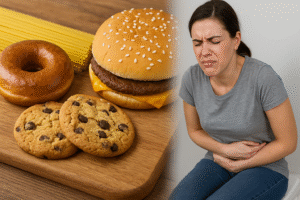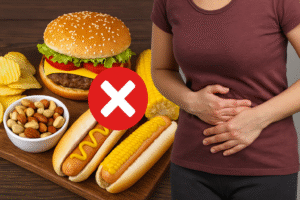When you’re sick, good nutrition can help your body heal more quickly. But while everyone’s concerned with what to eat — say, warm soups or vitamin-packed fruits — what people don’t always think about is the food to avoid when sick. Some foods might irritate your stomach, cause inflammation or weaken your immune system and make it more difficult for you to recover.
Here are eight everyday foods and drinks you may be better off avoiding when you’re sick. Trimming those from your diet — at least temporarily — can lightened your symptoms and help you bounce back more quickly.
1. Dairy Products
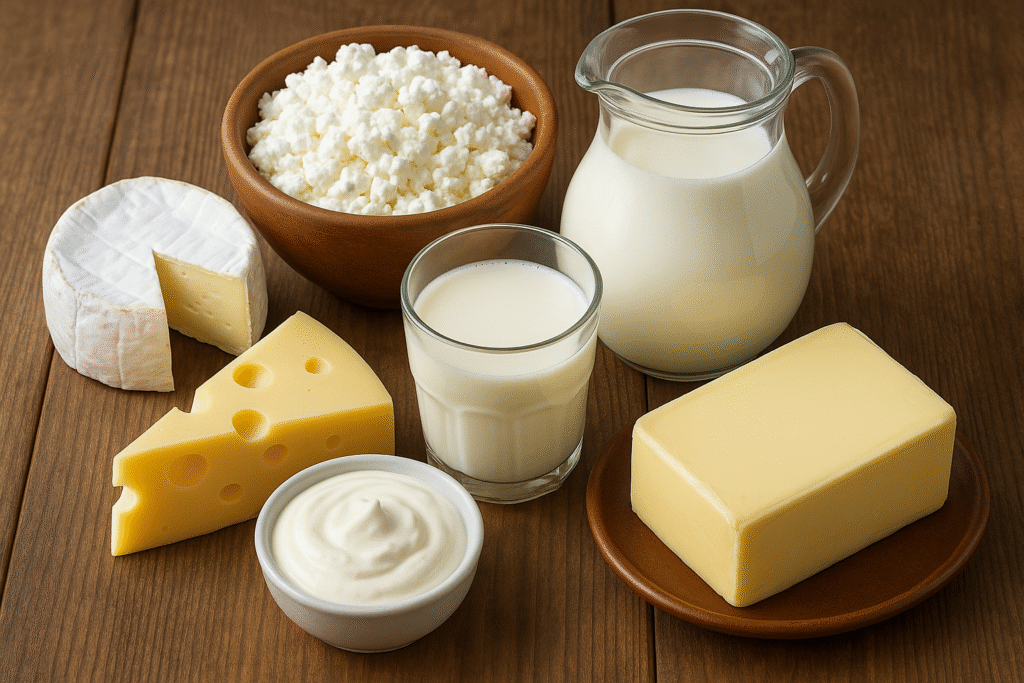
Why to avoid it:
Dairy can be a nutritional juggernaut when you’re healthy, but it might not be doing you any favors while you’re sick — especially if you’re stuffed up. For some, dairy thickens mucus or induces a feeling of a lump in the throat. And while it’s likely as much perception as biology, just the sensation of increased mucus can make symptoms seem worse. And milk and other full-fat dairy products can be harder to digest, especially if you’re already experiencing nausea, vomiting or diarrhea.
For those with a slight lactose intolerance or easily reactive to dairy, milk and cheese may cause bloating or cramps that don’t aid in recovery.
What to do instead:
Enjoy some oat, rice or almond milk with your tea or cereal. If you need a little protein, try mild, plant-based yogurt, or broths with some tofu or legumes mixed in.
Key takeaway:
Dairy may not bother everyone, but for many people, it’s on the list of what food to avoid when sick, because it can intensify congestion and lead to indigestion.
2. Sugary Foods and Drinks
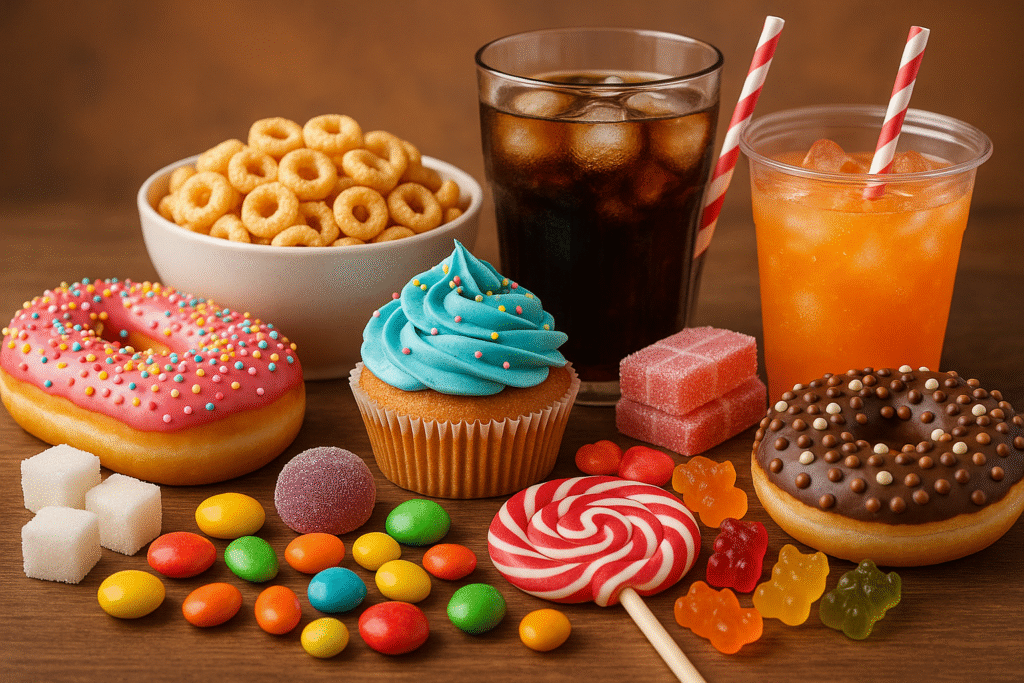
Why to avoid it:
While you’re sick, your immune system is your first line of defense. Too much sugar dampens immune activity, including that of white blood cells that engulf and destroy invading organisms. And, sweet foods can lead to surges and crashes in blood sugar that make you feel even more tired and grouchy.
Sugar also fuels the proliferation of bad bacteria in the gut. Because immune function is so closely tied to gut health, disturbing the gut microbiome with sugar-laden food may indirectly slow recovery, he explains.
What to do instead:
Opt for naturally sweet alternatives, such as stewed apples, mashed bananas, or a smoothie with unsweetened almond milk and berries. These options are full of fiber and vitamins without the unhealthy side effects of added sugars.
Key takeaway:
Processed sugar suppresses the immune system and raises inflammation. It’s a top worst food to avoid when sick, particularly in the early stages of illness.).”
3. Fried and Greasy Foods
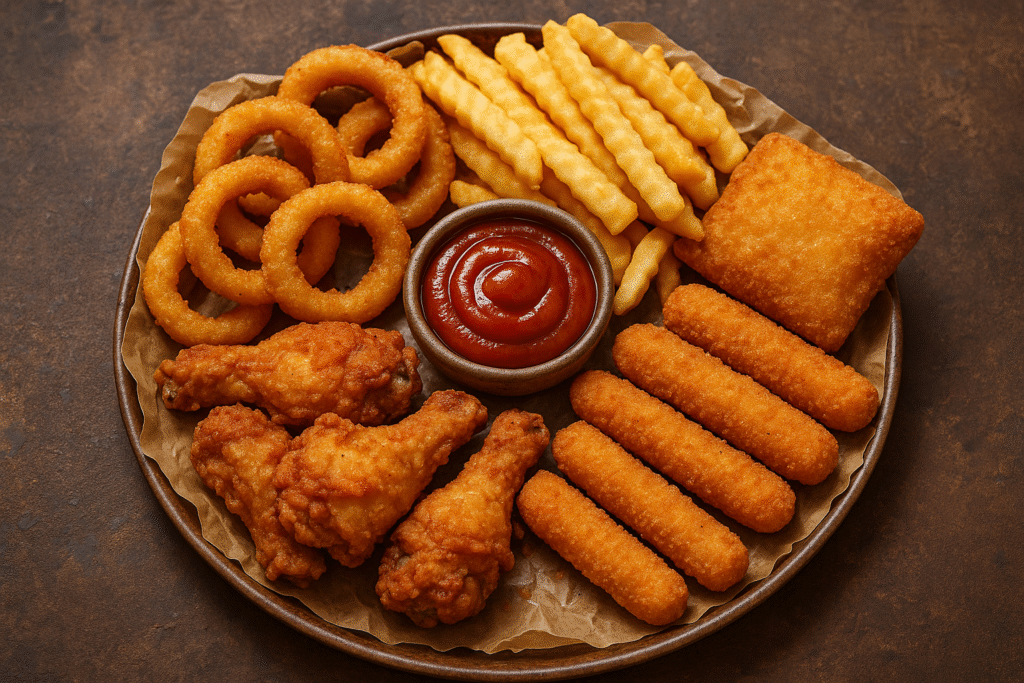
Why to avoid it:
Fatty meals, and especially fried foods, delay the emptying of the stomach. Heavy meals can exacerbate symptoms and decrease an appetite when you’re already fatigued or nauseated. Oily foods also often contain trans fats or oxidized oils, both of which are pro-inflammatory for your entire body.
If you are feverish or have an upset stomach, then the health of your digestive system has been compromised. The digestion of fat-laden meals takes energy away from protecting us.
What to do instead:
Instead of fried chicken, go for a piece of baked fish or a boiled egg with dry toast. These provide protein without the fat-bomb.
Key takeaway:
Nothing’s more comforting than fried foods, but they weigh heavy on your digestion and increase inflammation, explains Dr. Lipman, so they’re one of the gunky food to avoid when sick.
4. Caffeinated Beverages

Why to avoid it:
Caffeine is a stimulant to the central nervous system and a diuretic, so it can dehydrate you, which can be (obviously) problematic when you’re already losing fluids from fever, diarrhea, or sweating. It can also sabotage critical sleep by increasing cortisol and adrenaline levels, making it more difficult to unwind and fall asleep.
Too much caffeine can also irritate the stomach lining and lead to even more aches and nausea (cue, the heartburn).
What to do instead:
Swap coffee for caffeine-free teas, like ginger (ideal for nausea), peppermint (helpful with digestion), or chamomile (good for sleep). Warm water with lemon and honey is also soothing and hydrating.
Key takeaway:
Avoid the coffee and energy drinks. Another food to avoid when sick is caffeine due to its sleep-disturbing, hydration-depleting qualities.
5. Spicy Foods
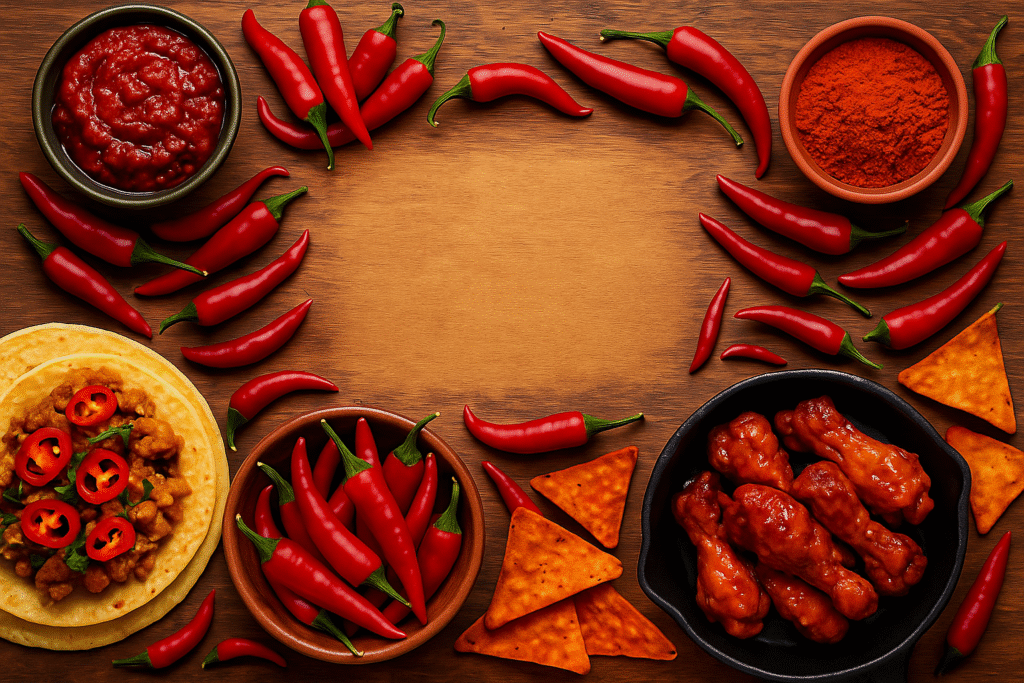
Why to avoid it:
And though spicy foods like chili or hot sauce can temporarily open nasal passages, the capsaicin that makes them hot is also an irritant. If your throat is already sore or irritated, spicy food can make it worse or lead to coughing, and even heartburn — especially when you’re lying down to get some rest.
In a situation of stomach upset due to a virus or sensitivity, the irritation caused by the spice to the lining of the stomach or intestines can make nausea or cramping worse.
What to do instead:
Stick to bland foods, like soft or white-cooked rice, moistened mashed potatoes, plain oatmeal or broths like chicken or beef. Flavor with herbs, like thyme or parsley, rather than with spice.
Key takeaway:
Spice isn’t always nice — especially when you have a sick stomach or a raw throat. It’s an obvious food to avoid when sick.
6. Processed Foods and Meats
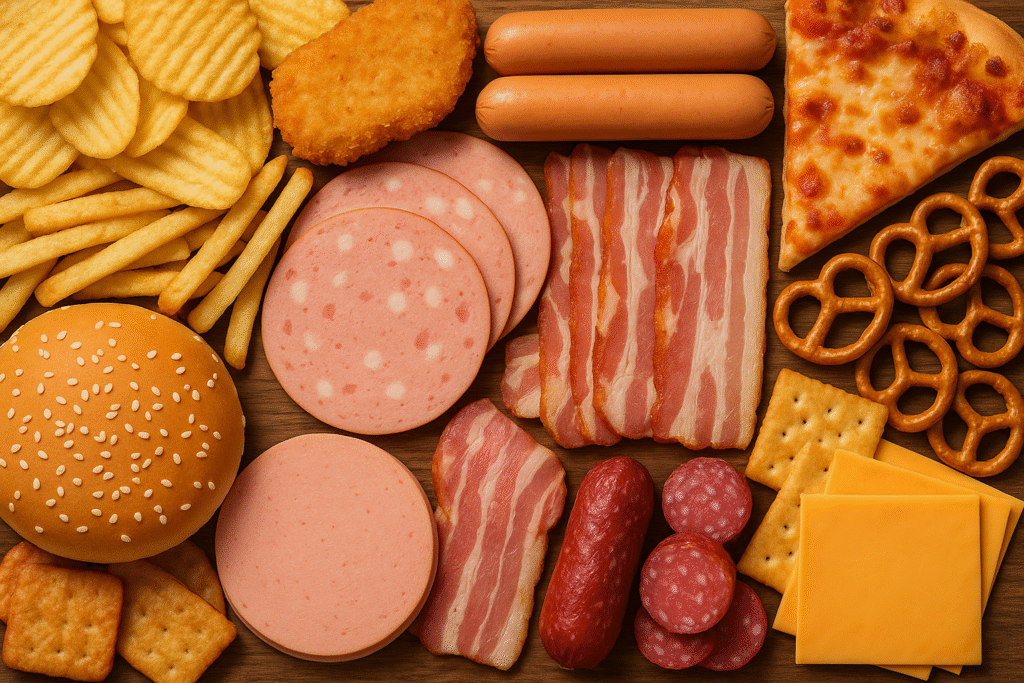
Why to avoid it:
Highly processed products — like instant noodles, cold cuts, chips and microwave meals, which are often high in sodium, preservatives, and refined carbs. These can dampen the immune response, ramp up blood pressure and cause dehydration. Plus, they’re missing the vitamins and antioxidants your body needs to recover.
It’s also the case that many of these products include fillers or additives that your body can’t easily break down, and that could exacerbate feelings of fatigue or bloating.
What to do instead:
Construct simple, whole-food meals: boiled rice with steamed vegetables, eggs, a mild lentil stew. Keep it light with fresh herbs and a wee bit of salt.
Key takeaway:
Most processed foods are not very conducive to healing and usually impair hydration. They’re one of the first kinds of food to avoid when sick.
7. Alcohol
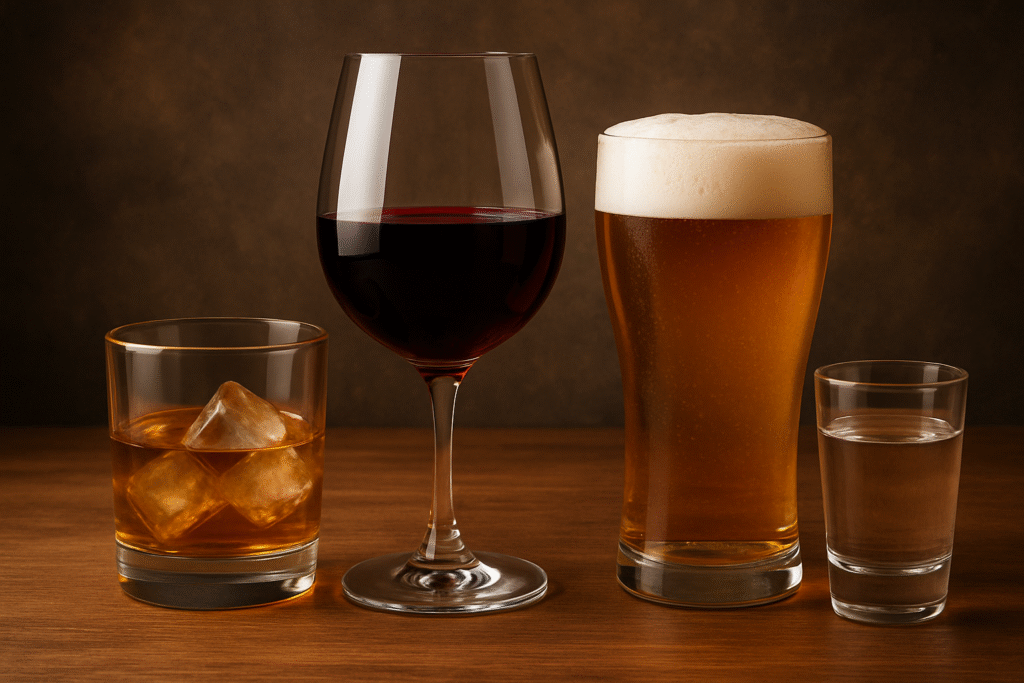
Why to avoid it:
Alcohol has a direct immune suppressive effect especially on white blood cell function. It also can interfere with the gut lining and sleep patterns. Both the health of your gut and quality sleep are vitally important while you’re sick. Alcohol is also a diuretic, causing loss of fluids at a time when you need to be hydrating.
Alcohol can also have a bad interaction with medications such as antibiotics, painkillers or decongestants.
What to do instead:
Choose warm herbal teas and rehydration drinks containing electrolytes. And even a small dash of salt is better than nothing for soothing and, yes, hydrating.
Key takeaway:
Alcohol places a burden on every system of the body that is part of the recovery process. It’s an unapologetic food to avoid when sick.
8. Acidic Fruits and Foods
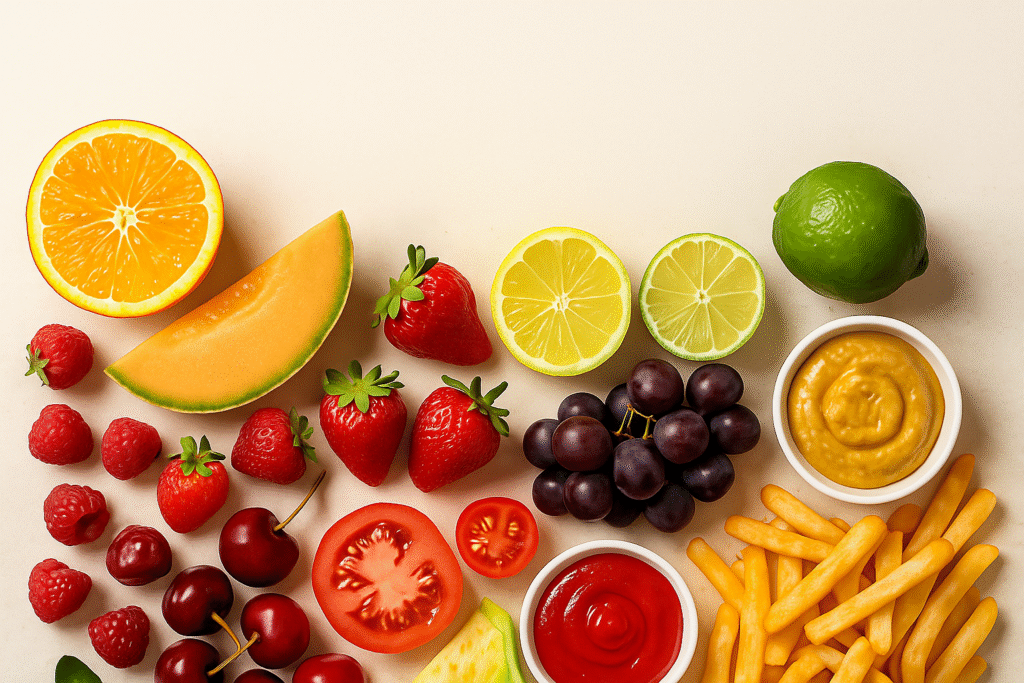
Why to avoid it:
Citrus fruits, tomatoes, and acidic foods, like those in vinegar. If your throat is sore or you have a stomachache, acid can cause increased pain for a few days, and may exacerbate coughing or lead to digestive malaise. It’s not that these foods are bad for your health; they just should be steered clear of when you are experiencing symptoms.
You can slowly reincorporate these vitamin C-rich foods when your throat and stomach start to feel better to help boost your immune system.
What to do instead:
Opt for fruits such as ripe bananas, steamed pears or cooked apples. They are mild with a tinge of nutrition.
Key takeaway:
While acidic foods can be healthy overall, they may be bad for a sick stomach or throat (or one that has just eaten them).
Final Word: How You Can Help Your Body to Heal
It’s not just about what to eat when you’re under the weather, but we all know it’s equally important to know what food to avoid when sick. Avoiding the wrong food can make it easier to cope with the symptoms, avoid irritation, and speed healing.
To recap, avoid:
- Dairy (if it aggravates your symptoms)
- High-sugar snacks and drinks
- Fried and greasy meals
- Caffeinated beverages
- Spicy dishes
- Processed foods
- Alcohol
- Acidic fruits or sauces
Instead, feed yourself with soft, warm, hydrating and nutrient-dense foods that are easy on the body. So listen to your body, sleep in and give yourself the best chance to recover quickly.


